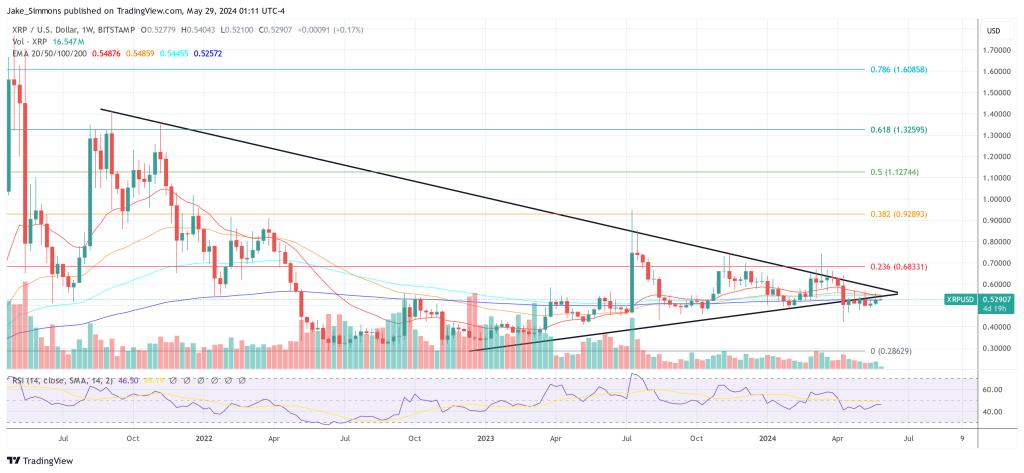As a researcher with a background in finance and law, I have closely followed the developments surrounding the SEC’s regulatory stance on cryptocurrencies like XRP and Ethereum (ETH). The ongoing allegations of biased practices by the SEC, as voiced by Bill Morgan and the Conservative Political Action Conference (CPAC), are a matter of great concern.
Bill Morgan, a prominent attorney known for his support of XRP, voiced concerns over the SEC’s alleged biased regulatory practices on social media. He claimed that the commission has shown favoritism towards Ethereum over XRP. This claim resonates with ongoing accusations against the SEC and its former official, William Hinman, which have escalated into formal complaints filed by the Conservative Political Action Conference (CPAC).
Morgan’s passionate remarks emerged on X, as he jokingly accused the XRP community of orchestrating a conspiracy regarding “ETH Gate.” This criticism came with a dose of sarcasm. It’s important to note that this statement was made before considering the SEC began investigating Ripple in April 2018, when XRP held the third-largest market cap, just behind Ethereum. The SEC draft of Hinman speech was being fine-tuned by numerous staff and lawyers at the time. How corrupting can a regulatory body be?
XRP Army Gets Backed By CPAC
The scrutiny over former Securities and Exchange Commission (SEC) official William Hinman’s actions has grown more intense following legal and ethical concerns. The Conservative Political Action Conference (CPAC) Foundation is spearheading this investigation, filing formal complaints with the New York and California Bar Associations against Hinman. The Center for Regulatory Freedom at CPAC accuses him of unethical behavior and potential conflicts of interest during his time at the SEC.
The claims trace back to Hinman’s significant 2018 address, in which he elaborated on Ethereum (ETH)’s regulatory classification, proposing it fall outside the security category—a determination resulting in substantial consequences throughout the cryptocurrency sphere.
Last week, Andrew Langer, who is the Director of the CPAC Foundation’s Center for Regulatory Freedom, filed ethics grievances against William Hinman with the New York and California Bar Associations.
Evidence…
— CPAC (@CPAC) May 28, 2024
Andriew Langer, head of the CPAC Foundation’s Center for Regulatory Freedom, expressed concerns in the complaint, suggesting that Mr. Hinman’s professional ties and actions during his tenure at the Securities and Exchange Commission (SEC) merit a comprehensive examination by the relevant bar associations due to potential ethical issues.
As an analyst, I’d rephrase it this way: My focus is on the significant role William Hinman has played in the ongoing controversy. Following his departure from Simpson Thacher & Bartlett (STB), a renowned firm specializing in financial services and blockchain technology, Hinman joined the Securities and Exchange Commission (SEC) in May 2017 as the Director of its Division of Corporation Finance.
In June 2018, Hinman gave a speech that clearly distinguished Ethereum from securities, thereby exempting it from intense regulatory oversight typically required for security transactions.
During this talk, Simpson Thacher became engaged in the Enterprise Ethereum Alliance (EEA), an entity dedicated to advancing Ethereum’s adoption across industries. Notably, CPAC’s grievance centers around a perceived conflict of interest. It brings up the fact that Hinman’s previous law firm could potentially benefit financially from Ethereum’s growing market influence, which some argue may have been impacted by Hinman’s regulatory directions.
The complaint by CPAC relies heavily on a series of internal SEC emails and external communications, which include dialogues with Ethereum co-founder Vitalik Buterin prior to Hinman’s 2018 speech. These documents were uncovered during the extensive discovery process in the ongoing SEC lawsuit against Ripple Labs. Ripple, whose XRP token was classified by the SEC as a security in a late 2020 lawsuit, arguably faced harsher regulatory treatment than Ethereum, a point of contention highlighted by critics like pro-XRP lawyer Bill Morgan.
At press time, XRP traded at $0.52907.

Read More
- SOL PREDICTION. SOL cryptocurrency
- USD ZAR PREDICTION
- BTC PREDICTION. BTC cryptocurrency
- LUNC PREDICTION. LUNC cryptocurrency
- EUR ILS PREDICTION
- CKB PREDICTION. CKB cryptocurrency
- USD COP PREDICTION
- REF PREDICTION. REF cryptocurrency
- MDT PREDICTION. MDT cryptocurrency
- LOVELY PREDICTION. LOVELY cryptocurrency
2024-05-29 10:11